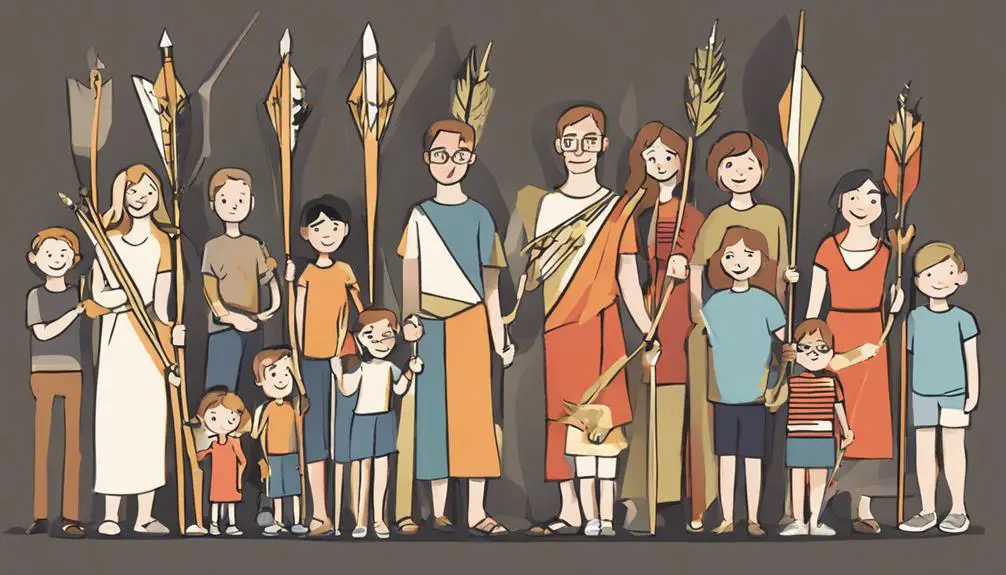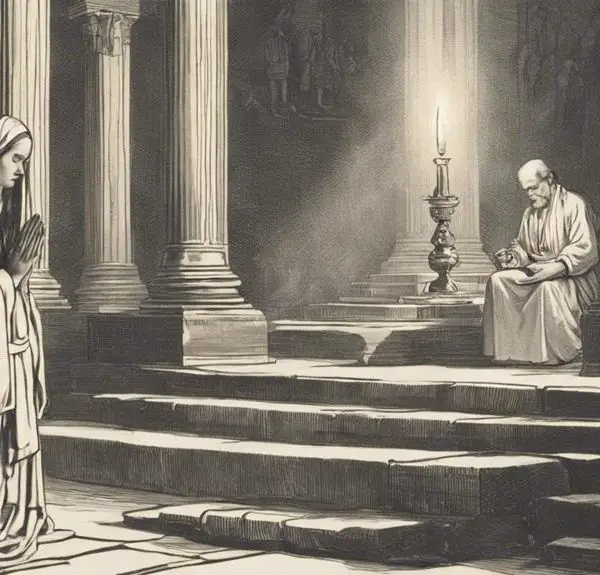Mystery or math? Unravel the intriguing debate about the biblical interpretation of a 'quiver full' and its implications on family size.

How Many Is a Quiver Full in the Bible
While you might think the term 'quiver full' in the Bible is just an ancient metaphor with no clear numerical value, it's more complex than that. The concept, often linked to family size due to its mention in Psalms 127:3-5, has sparked intriguing debates among scholars and theologians.
Is it merely symbolic, or does it have a specific numeric implication? So, what's the consensus? Well, let's just say the answer isn't as straightforward as you might hope.
Stick around, you're about to embark on an enthralling exploration of biblical interpretation and its implications.
Key Takeaways
- The Bible does not specify a particular number for a 'quiver full', leaving it open to interpretation.
- 'Quiver full' is generally understood to represent a large family, emphasizing quality over quantity.
- 'Quiver full' is a metaphor for spiritual fruitfulness and abundance, rather than a literal numerical figure.
- The number of arrows in a 'quiver full' is a topic of debate and largely depends on cultural and personal perspectives.
Understanding the Term 'Quiver Full

To grasp the concept of a 'quiver full', you must delve into the historical and cultural contexts within which the Bible was written. The term originates from 'quiver', a container for holding arrows. Quiver symbolism is deeply embedded in ancient weaponry, representing a warrior's readiness for battle.
In archaic societies, arrows were a primary weapon, and a full quiver was a symbol of strength, protection, and preparedness. It embodied not just a warrior's physical prowess, but also their strategic acumen and resilience. A warrior with a full quiver was respected and feared, their status elevated. They had the power to defend, to attack, and to determine the outcome of battles.
Likewise, the term 'quiver full' carries a weight of significance in biblical texts. It's not merely about quantity, but about the quality of what's contained within. It's about being equipped, being ready, and being capable. That's why understanding the term requires an appreciation of ancient weaponry and the symbolic power of the quiver. So, when you read 'quiver full' in the Bible, you're engaging with a symbol of strength, readiness, and strategic capability.
Biblical Context of 'Quiver Full

Delving into the biblical context of 'quiver full', you'll find it deeply woven into the fabric of familial and societal dynamics, particularly in Psalm 127:3-5. This passage is fundamental to understanding the 'Quiver Full' origin and its associated Biblical symbolism. In this scripture, children are compared to arrows in the hands of a warrior, and the happiness of a man is likened to his quiver being full of them.
In the ancient Biblical era, a quiver full of arrows was a symbol of protection, strength, and preparedness for warfare. So, the metaphor of a 'quiver full' resonates deeply, portraying children not just as a blessing, but also as a source of strength, security, and societal influence for the family.
Beyond this, the imagery of 'quiver full' isn't just about quantity but quality. It implies that children, like arrows, should be carefully nurtured, guided, and directed to make meaningful impacts in life.
The biblical context of 'quiver full' thus offers a profound understanding of the value and role of children within the family and society, as well as the responsibilities of parents to shape their paths.
The Numerical Implications

Having explored the metaphorical significance of a 'quiver full', let's now consider the numerical implications in the biblical context. The Bible doesn't specify a number, yet quantitative symbolism and cultural significance suggest a deeper understanding.
- Firstly, the quiver, a container for arrows, suggests readiness for battle. The more arrows, the better prepared one is. Thus, a 'quiver full' could symbolize a large family, ready to take on life's battles.
- Secondly, in ancient Near Eastern culture, having many children was seen as a blessing. A 'quiver full' might therefore imply a bounty of children.
- Thirdly, considering numbers in the Bible often carry symbolic significance, the lack of a specific quantity could indicate that it's not about quantity but quality.
- Fourthly, it's necessary to consider the socio-cultural setting of biblical times. Large families ensured survival and continuity, affirming the cultural significance of a 'quiver full'.
- Lastly, the term 'quiver full' might be a metaphor for spiritual fruitfulness, where a large number signifies abundant blessing.
Quiver Full' in Modern Interpretations

In modern interpretations, you'll find that the biblical concept of a 'quiver full' has been reimagined and applied in various ways, reflecting differing societal contexts and individual beliefs. Today, 'quiver full' can be symbolic of the joys and challenges of modern parenthood, representing a full and rewarding life. It's also been used as religious symbolism, a metaphor for a family's spiritual journey.
To illustrate, consider this breakdown:
Modern Interpretation |
Explanation |
|---|---|
:-: |
:-: |
Parenthood Symbolism |
A 'quiver full' is often seen as the embodiment of modern parenthood, symbolizing a life full of unique experiences and responsibilities. |
Religious Symbolism |
In religious contexts, a 'quiver full' can symbolize a family's commitment to their faith, signifying their spiritual growth and journey. |
Societal Context |
In different societal contexts, a 'quiver full' can represent varying degrees of familial ideals, from large families to those who focus on quality over quantity. |
In these interpretations, you'll find a rich tapestry of meanings, each one offering a unique perspective on the concept of a 'quiver full'. This underscores the enduring relevance and versatility of this biblical phrase in our modern world.
Debates Surrounding 'Quiver Full

You might find yourself in the midst of varied opinions when it comes to interpreting the concept of 'quiver full'. This debate has garnered attention due to differing cultural perspectives and familial interpretations.
A few of the most debated aspects include:
- The number of arrows a 'quiver full' should hold: Some argue it's as many as a family can bear, while others peg it at a specific number.
- The cultural perspectives: Different cultures interpret 'quiver full' differently, influencing their understanding and applications.
- Familial interpretations: Each family may see the concept differently, influenced by their unique environments and beliefs.
- The role of metaphor: Some argue the term 'quiver full' should be viewed metaphorically and not literally.
- The emphasis on procreation: There's a debate whether the phrase encourages uncontrolled procreation or if it's about raising godly children.
The 'quiver full' debate isn't just about a number. It's about understanding a biblical concept in the context of our realities. Interpretation, thus, becomes a task of reconciling ancient text with modern understandings, personal beliefs, and societal norms.
Frequently Asked Questions
How Is the Term 'Quiver Full' Used in Other Religious Texts Outside the Bible?
In other religious texts, the term 'quiver full' isn't specifically used as it is in the Bible. For instance, in Buddhism and Hinduism, there's no direct equivalent. However, these religions do have teachings on family life and procreation which might be compared to the concept of a 'quiver full'.
It's crucial to understand the cultural and historical contexts of these religions to fully grasp their perspectives on family size and procreation.
What Are Some Practical Applications of the 'Quiver Full' Concept in Contemporary Society?
You might see the 'Quiver Full' concept put into practice in contemporary parenting styles. Some families value having many children, viewing each as an arrow in their quiver.
The societal implications are multifaceted. It can potentially strain resources, but also fosters diversity and resilience.
It's important to analyze the costs and benefits of this approach in our modern world.
Are There Any Historic Events or Figures That Have Used the Concept of 'Quiver Full' in Their Actions or Teachings?
You've likely encountered the 'Quiver Full' movement in your studies. This evangelical movement, whose name derives from Psalm 127:3-5, advocates for large families.
Historical analysis reveals significant impact on societal norms and policies. Figures like Jim Bob and Michelle Duggar who publicize their adherence to this movement have influenced cultural perceptions of family size and parental roles.
It's an interesting case of religious interpretation shaping societal behavior.
How Might the Concept of 'Quiver Full' Be Used in Philosophical or Theoretical Discussions?
In philosophical discussions, you might use 'quiver full' as a symbolic interpretation of ethical responsibilities. It's not about how many arrows are in the quiver, but the quality of each.
Therefore, you're not just aiming for quantity, but also nurturing, developing, and refining each one.
Can the Term 'Quiver Full' Be Seen as a Metaphor in Any Other Contexts Apart From Biblical Interpretations?
You can indeed find 'quiver full' symbolism in other contexts outside biblical interpretations.
This phrase often represents abundance or preparedness.
In literature, a 'quiver full' could metaphorically signify a character's readiness to face challenges.
In life, it can symbolize having a full set of skills or resources at your disposal.
Conclusion
In conclusion, you'll find that 'quiver full' in the Bible doesn't provide a specific number, rather it signifies abundance and blessing. Modern interpretations vary, sparking debates among scholars and believers.
Ultimately, it's a deeply personal interpretation, reflecting one's faith, values, and life circumstances. Remember, the Bible often uses metaphors to convey broader, spiritual truths, so focus on the essence rather than a literal count.



Sign up